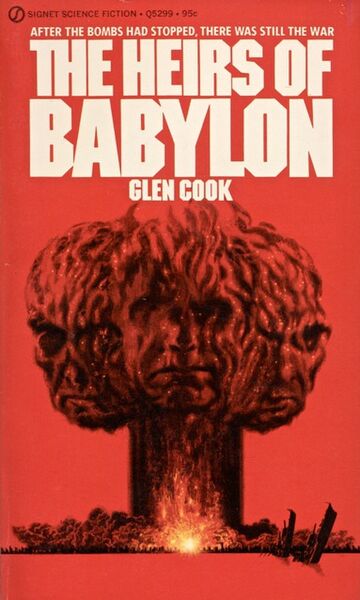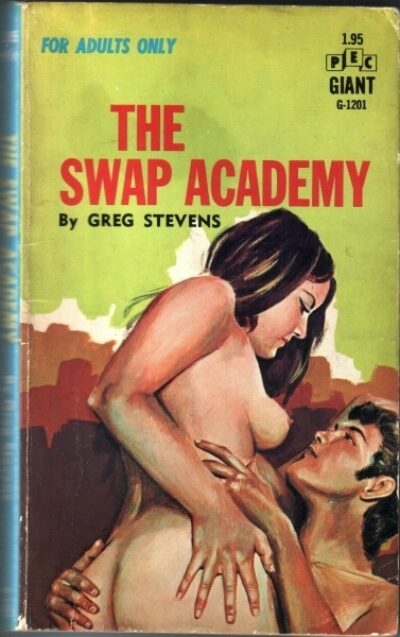A Hero’s Welcome
The Heirs of Babylon
By Glen Cook

8 Jun, 2025
Glen Cook’s 1972 The Heirs of Babylon is a stand-alone post-holocaust novel.
Two centuries earlier, Germany was reduced from one hundred million people to one hundred thousand. The survivors’ descendants are concentrated in the Baltic Littoral. Germany and the neighbouring nations were lucky. Some nations, such as China, were extirpated1.
The Baltic Littoral’s people live hand-to-mouth. Little can be spared to rebuild. Blame the perfidious Australians.
It is the classic guns versus butter dilemma. If the Littoral skimps on defense to improve the domestic economy, the Australians, those human monsters responsible for the great war, would invade and conquer the Littoral, reducing the unfortunate inhabitants to subsistence living. Therefore, the common good demands that the people of the Littoral embrace subsistence living, so all surpluses can be funneled into defense.
Defense alone is not sufficient. Every generation, the Littoral’s men sally forth to the Gathering, to join their allies in a bold effort to crush the Australian threat once and for all. The ships rarely return. Nor do their crews. Nevertheless, the High Command and the Political Office are determined to continue their efforts.
Karen Ranke believes that the war is pointless. The best course of action would be to flee for Telemark, beyond the Political Office’s reach. Karen’s husband Kurt doesn’t think Karen is wrong. Nevertheless, Kurt has agreed to serve as lead quartermaster on the ancient destroyer Jager.
The journey across the world will be long, slow, dangerous, and difficult. Jager, originally USS Cowell when it was launched in 1943, is rundown. Coal is in short supply, so for most of the trip it will burn wood. Thus, the ship is overloaded with fuel and low in the water; its centre of gravity is dangerously high. Nobody has the industry needed to make new parts; thus, repairs are accomplished with salvaged, retrofitted components.
Of more immediate concern, as unlikely as that sounds on a ship likely to turn turtle in the next storm it encounters, is the political situation onboard Jager. Many of the crew who were cajoled, bullied and threatened into signing up believe that the war cannot be won, that all that waits is death. Mutiny is possible, even likely.
The Political Office is well aware of this. Each ship has Political Officers, with the power to summarily execute dissenters. The Political Office also employs an army of informers and assassins. Anyone could be a covert agent of the Political Office.
Judging by the immediacy with which death follows quiet dissent, the Political Office has planted at least one assassin onboard Jager. Kurt is keen to work out who that would be. Many of the victims are Kurt’s friends and it’s not impossible that Kurt himself could be a target.
Why? Kurt is determined to learn English. Ostensibly this is so that Kurt can better read captured charts. His true purpose is to read a forbidden history of the war that destroyed the world two centuries ago.
Why does the secret history differ so radically from the official history? What is the Political Office’s true goals? And, given Kurt’s poor odds of survival, does any of that matter?
~oOo~
Babylon is a very early Cook novel2. In fact, it is his first novel under his own name, his 1970 debut novel, The Swap Academy, having appeared under the penname Greg Stevens3. The Swap Academy was not SF.

Readers who knew only that Cook’s previous novel was steamy erotica might have been hopeful about the implications of the word “Babylon” in the title. Surely, racy adventures await! Alas for such readers, Cook was likely referencing the same biblical take on Babylon as an earlier work about nuclear holocaust, Pat Frank’s Alas, Babylon (1959). The Bible is oddly cool on Babylon.
A Biblical quote4 from the beginning of Cook’s Babylon:
Fallen, Fallen is Babylon the Great!
It has become a dwelling place of demons
A haunt of every foul spirit
A haunt of every foul and hateful bird;
For all nations have drunk the wine of her impure passion,
And the kings of the earth have committed fornication with her,
And the merchants of the earth have grown rich with the wealth of her wantonness.
Emphasis on the first four lines. Granted, the giant mushroom cloud on the cover should be a hint that this is not going to be a charming comic romp.

The last four lines figure into the plot only in a historical, largely metaphoric sense: why did the nations of Earth pursue a course of action that reduced the human population by three orders of magnitude (or more)?
If the forbidden account of the global war two centuries earlier is as truthful as it appears to be, the instigating crisis was the discovery that omitting externalities from balance sheets has no preventative effect. It’s a good thing that the hazards of willful blindness in the name of profit has no relevance to the modern world in which we live.
Readers may be surprised to discover that this tale of homicidal, paranoid cloak and dagger, set on an almost certainly doomed ship sailing to an apparently futile battle in pursuit of nebulous goals is gloomy and morose. A few may hold out hope for a eucatastrophe that at least offers the possibility of a better world. Those readers have probably never read a Glen Cook novel.
Cook is relentless in his doleful purpose. This slender novel is uneven, but one can see the writer Cook would become a decade down the line. I don’t know that I would recommend Babylon to everyone, but Cook fans may find it of interest.
The Heirs of Babylon is available here (Barnes & Noble), here (Bookshop US), here (Chapters-Indigo), and here (Words Worth Books).
I did not find The Heirs of Babylon at Bookshop UK. More oddly, I did not find The Heirs of Babylon at Night Shade Books, the ostensible publisher. I did discover that Night Shade lists authors alphabetically… by given name.
1: USA delenda, along with pretty much every other nation.
2: Fans who know Cook as a fantasy author might be surprised that his debut novel under his own name was SF. Between 1972 and 1988, Cook wrote ten SF novels and fourteen fantasies. The inflection point appears to be 1988 The Dragon Never Sleeps, which thanks to egregious publisher mismanagement sold poorly. Between 1989 and today, Cook published twenty-six novels… all fantasy as far as I can tell.
3: I just noticed the dollar ninety-five Publisher’s Export Company wanted for a 176-page novel, in a year when seventy-five cents was a more common price for such a work.
4: Revelations 18:2 – 3. Not sure of the translation.
